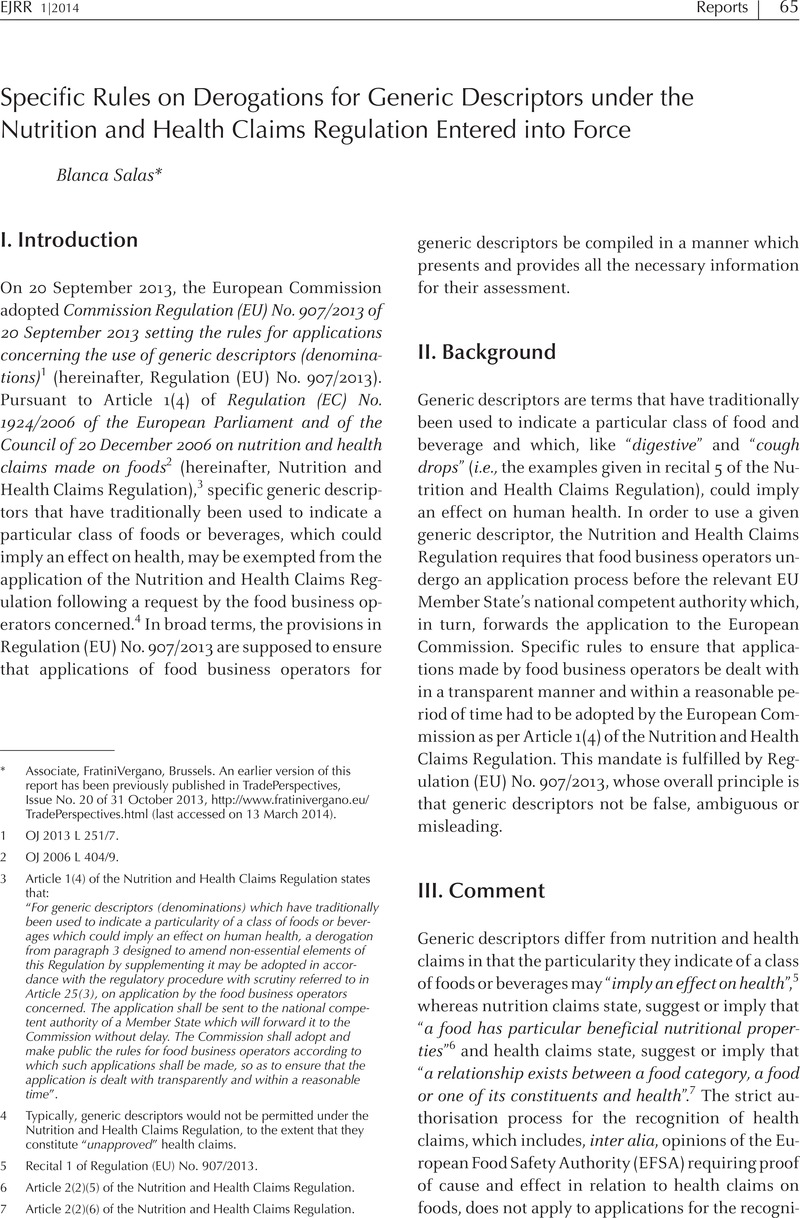No CrossRef data available.
Article contents
Specific Rules on Derogations for Generic Descriptors under the Nutrition and Health Claims Regulation Entered into Force
Published online by Cambridge University Press: 20 January 2017
Abstract

Information
- Type
- Reports
- Information
- Copyright
- Copyright © Cambridge University Press 2014
References
1 OJ 2013 L 251/7.
2 OJ 2006 L 404/9.
3 Article 1(4) of the Nutrition and Health Claims Regulation states that: “For generic descriptors (denominations) which have traditionally been used to indicate a particularity of a class of foods or beverages which could imply an effect on human health, a derogation from paragraph 3 designed to amend non-essential elements of this Regulation by supplementing it may be adopted in accordance with the regulatory procedure with scrutiny referred to in Article 25(3), on application by the food business operators concerned. The application shall be sent to the national competent authority of a Member State which will forward it to the Commission without delay. The Commission shall adopt and make public the rules for food business operators according to which such applications shall be made, so as to ensure that the application is dealt with transparently and within a reasonable time”.
4 Typically, generic descriptors would not be permitted under the Nutrition and Health Claims Regulation, to the extent that they constitute “unapproved” health claims.
5 Recital 1 of Regulation (EU) No. 907/2013.
6 Article 2(2)(5) of the Nutrition and Health Claims Regulation.
7 Article 2(2)(6) of the Nutrition and Health Claims Regulation.
8 “EU Regulation on generic descriptors published: a solution for probiotics?”, 21 September 2013, available on the Internet at: http://www.ylfa.org/news2.php?ID=40 (last accessed on 13 March 2014).
9 Reportedly, the Yoghurt & Live Fermented Milks Association (YLFA) submitted an application for recognition of the term “probiotic” as a generic descriptor in December 2012 through two EU Member States. Rick Pendrous, “Probiotic labelling bid shaky, says top legal group”, Food Manufacture UK, 30 October 2013, available on the Internet at: http://www.foodmanufacture.co.uk/Regulation/Probiotic-labelling-bid-shaky-says-top-legal-group (last accessed on 13 March 2014).
10 Alfred Hagen Meyer, Rudolf Streinz, Lebensmittel- und Futtermittelsgesetzbuch, Kommentar, 2. Ed. (Munich: C.H. Beck 2002) HCVO, note 68.
11 The recipient EU Member State must notify the applicant of receipt of the application within fourteen days. The acknowledgement must specify the date of receipt.
12 EU Member States concerned have four weeks to inform the recipient EU Member State in case of an incomplete application.
13 The European Commission must confirm receipt of the valid application in writing to the recipient EU Member State within 14 days.
14 Other EU Member States may also submit their opinions to the European Commission within the same timeframe and under the same conditions.
15 The summary of the application must include: the name and address of the applicant, the generic descriptor subject to the application, a brief description of the particularity of the class of foods or beverages covered by the generic descriptor and an indication of the EU Member States where the applicant seeks authorisation to use the generic descriptor.
16 In May 2012, the European Commission adopted Commission Regulation (EU) No. 432/2012 of 16 May 2012 establishing a list of permitted health claims made on foods, other than those referring to the reduction of disease risk and to children's development and health, OJ 2012 L 136/1. Pursuant to Article 13(3) of the Nutrition and Health Claims Regulation, it includes a list of 222 permitted health claims, as approved by the SCFCAH in 2011. This list was the result of a scientific assessment conducted by EFSA in 2010 over a list of 4,600 claims, consolidated by the European Commission on the basis of lists submitted by EU Member States in 2008 containing approximately 44,000 claims.

